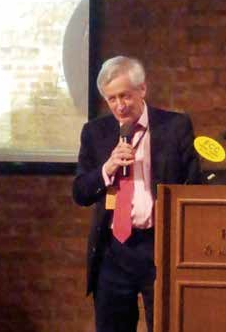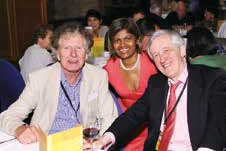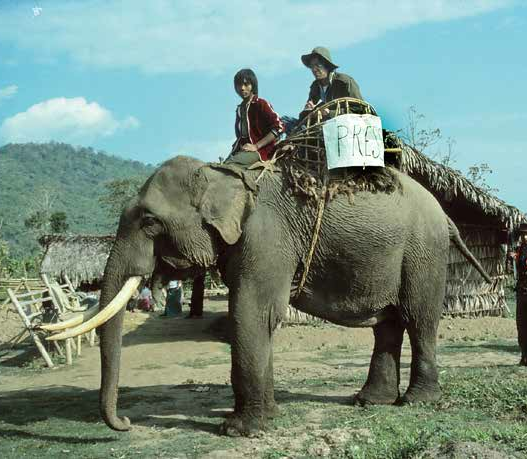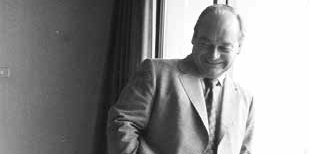Issue:
Celebrating a publication that changed the face of the Asian media, and the lives of its correspondents
Sic transit gloria FEER. That last word is not bad Latin but an acronym for the late lamented Far Eastern Economic Review, the 10th anniversary of whose untimely passing was celebrated or “mourned” by some one hundred ex-staffers including myself at a Hong Kong reunion in early April.
The “glory” of the Review had already been diminished by the time that its thenowners, Dow Jones, decided to kill it off 10 years ago by turning the former beacon of irreverent and incisive Asian journalism from a weekly magazine into an irrelevant monthly journal of opinion. It had been owned by a number of Hong Kong companies, including the Hongkong & Shanghai Banking Corp. before Dow moved from being a minority shareholder to full ownership of the magazine.
Several short-lived editors continued to trade on the reputation of the Review’s greatest editors Derek Davies, and his gifted immediate successor Philip Bowring after they were disposed of by the Review’s owners, as did various newlyrecruited correspondents.
But the light of inspired “tell it like it really is” journalism that had illumined the magazine for decades from its founding as a humble, Shanghai-based newsletter after World War II through its glory decades in Hong Kong had not so much faded as been snuffed out.
The lives of many of the Review “Greats” have also been terminated since by the passage of time and it was only the ghosts of people such as Derek Davies, Richard Hughes, David Bonavia, Donald Wise and others that gathered with us in the former British colony to remember the Review as it was.
Bowring was there, however, and it is a tribute to the remarkable sense of camaraderie or family that pervaded the Review in its heyday (often in the face of real adversity such as correspondent arrests) that former staffers also came from all corners of the earth to be present.
I was Singapore bureau chief, then Business Editor of the Review for 10 years from 1977, and later International Finance Editor in London and Tokyo, until 1993. During those years I had the privilege of working with some of the Review’s most colorful characters.
None was more colorful than Derek Davies himself, a mercurial and boisterous Welshman, who graduated from being a British diplomat to editor of the Review for 25 years.
Davies’ name became synonymous with that of the FEER but never with fear. He boldly went where other journalists feared to tread, often offending presidents and prime ministers alike when there was a need to chronicle corruption, incompetence, arrogance or worse at the top.
TWO MEN BREEZED INTO THE OFFICE AND DEMANDED TO KNOW WHO I WAS. I SAID I WOULD CALL THE POLICE “WE ARE THE POLICE,” ONE OF THEM RESPONDED
His personal magnetism (although he could also be as cutting in his manner as his writing style was incisive) attracted a wide range of gifted writers from diverse backgrounds, multiple disciplines, cultures, political and religious beliefs and different ideological persuasions. His gift as an editor was, paradoxically, not to edit. Or, at least, not to over-edit. The Review during his reign chose its correspondents more by instinct than on the basis of formal journalistic qualifications and then trusted to their judgment “on the ground” or in the field.
The Review’s “style” was the antithesis of American-style journalism while Davies and Bowring were in charge. The magazine did not always demand quotes to back up stories but instead trusted writers to cultivate sources who felt freer to talk if they knew they were not being quoted.
Davies presided over his “empire” as might a prime minister over his territories, receiving dispatches (stories) from his embassies (bureaux) and printing them for the information and enlightenment of what were, at the peak, 85,000 subscribers.
What enraged rather than amused some of those readers, especially those in high places, was precisely the fact that the Review believed in editorial honesty rather than kowtowing to national leaders and others in Asia who expected journalists to “show respect” even where none was due.
When Review correspondents were not actually imprisoned, as a number were, in Southeast Asia especially, they were often hauled into court to answer trumped-up charges that amounted to no more than having the temerity to tell the truth. But the Review always backed up its correspondents.
I vividly recall my own first day in the former Singapore Marina House office in Shenton Way in 1977. I had gone in on a Saturday morning ahead of my scheduled first appearance the following Monday morning, in order to familiarize myself with the layout.
About half way through the morning, two rather nondescript-looking men in casual attire breezed into the office and demanded to know who I was. I, in turn, demanded to know who they were and when they declined to answer I said I would call the police. “We are the police,” one of them responded.
They were from the Internal Security Department. Imagine my astonishment when they brought my colleague Ho Kwon Ping into the office in handcuffs! After another colleague and even my secretary were arrested I came to appreciate the need for strong editorial backup.
At least I was not arrested, though other Review staffers such as Salamat Ali in Pakistan, Murray Hiebert in Indochina and others came to know prison cells from the inside. All this, of course, served to enhance the reputation of the publication for reporting “without fear or favor.”




Clockwise from top left The author speaking at the reunion; Philip Bowring, Rita Bidulph (widow of BBC Far East correspondent Jim Biddulph) and the author; Bertil Lintner on his elephant; the late Derek Davies at the FEER offices in the good old days.
There are lighter anecdotes to tell, such as when Bertil Lintner turned up for an interview in Indochina on the back of an elephant labeled “Press”; that being the only transportation available in a war zone. He had been offered a chance to rent a tank but preferred the elephant.
There was the hard-bitten professionalism of Review people like David Bonavia who had been bureau chief for The Times of London in Moscow and Beijing before joining. He could polish off a couple of bottles of claret at lunch and then write a perfectly cogent analysis of a complex subject. I know, as I edited his copy for some years.
There was the Review’s brilliant cartoonist, Morgan Chua, whose satirical and lampooning sketches could move some Asian leaders, as well as self-important individuals, to fury. It was the late Andrew Davenport’s searching exposés that helped put the Review on the map in business coverage (and even led to Hong Kong adopting insider trading laws).
It is invidious to mention a few more names but they should include Nayan Chanda, who stayed on in Saigon after its “fall” and filmed North Vietnamese tanks smashing down the gates of the presidential palace. Names like Rodney Tasker, John MacBeth, “Rocky” Pura, Richard Nations and (in Tokyo) John Lewis, Tracy Dahlby and Susumu Awanohara also stand out.
As Bowring wrote recently in the South China Morning Post, the Review’s “honesty and independence were established through its coverage of the Vietnam war, the Malaysian race riots in 1969, and the disturbances in Hong Kong both in 1966 the Star Ferry riots and during the Cultural Revolution.
“It quickly became viewed with hostility by governments around the region, not least in Hong Kong [where] the press remained relatively free while the situation elsewhere in the region was dire; Taiwan, Korea, Thailand, Indonesia all in the grip of authoritarian regimes, the media being gradually squeezed to death in Singapore, and muzzled in Malaysia and the Philippines.”
The Review “inspired other Hong Kongbased regional publications, including Asia Magazine, The Asian and Asiaweek. They brought improved standards of journalism, provided independent media in countries where the local ones were controlled, and encouraged the development of a cadre of Asian journalists who would flourish in their own countries.”
It was fitting somehow that the second day of the FEER reunion (after dinner, speeches and reminiscences at the Foreign Correspondents Club of Hong Kong on the first day) took the form of a boat trip to Po Toi island. The sea was rough enough to make some green around the gills but the Review never feared sailing into rough waters.
Anthony Rowley, a former President of the FCCJ, is currently Tokyo Correspondent of the Singapore Business Times and Field Editor (Japan) for Oxford Analytica.

